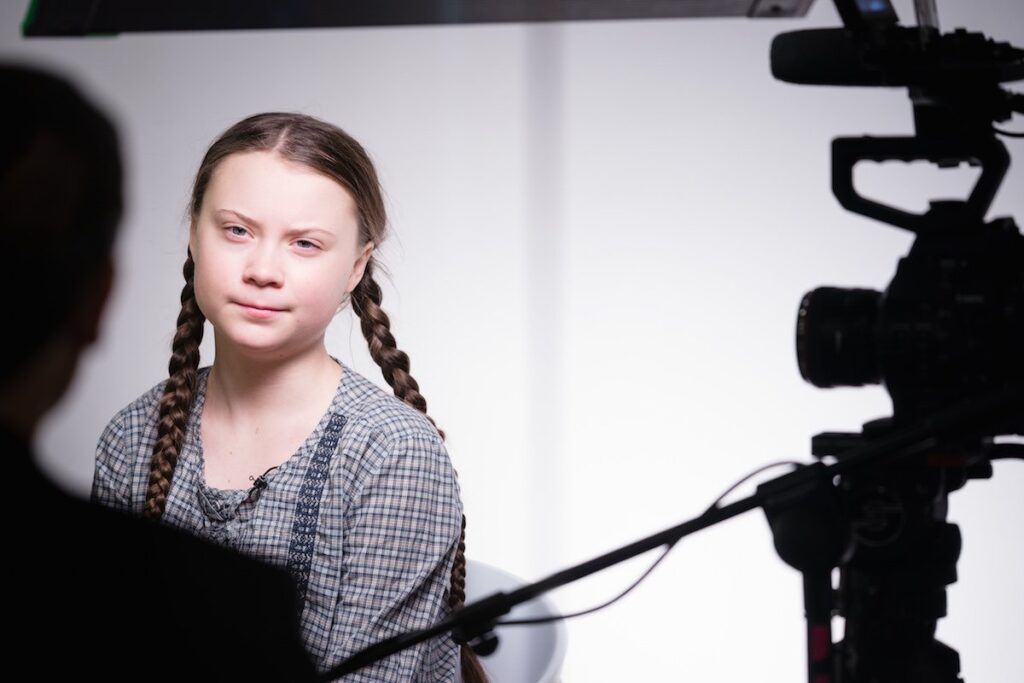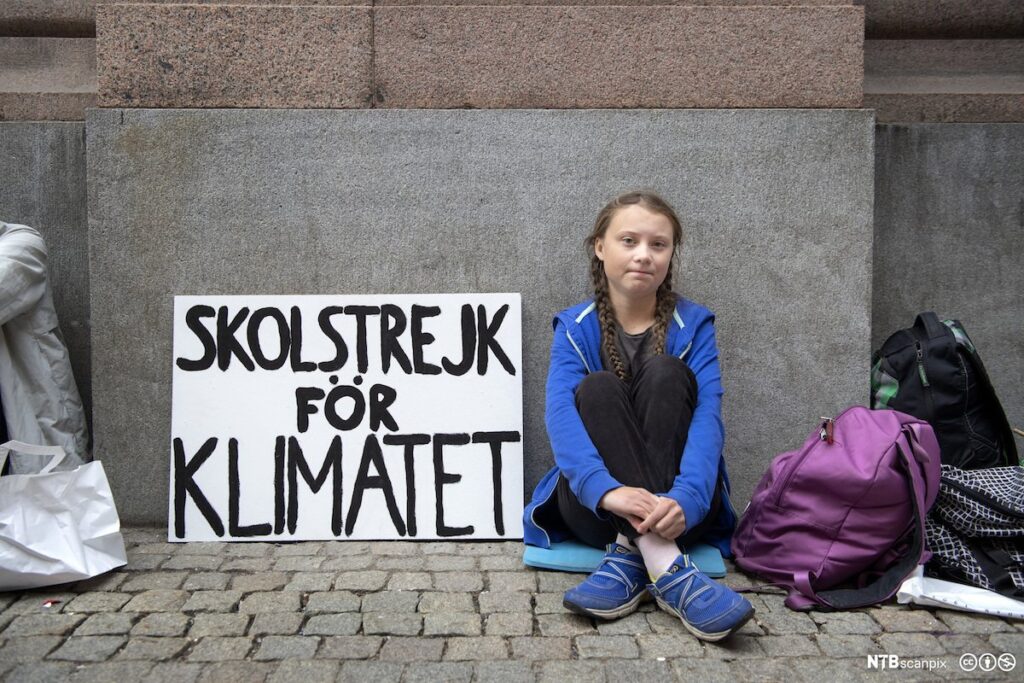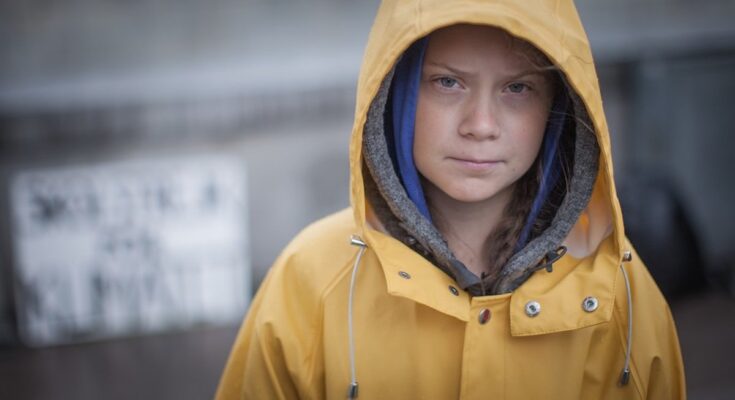In light of International Women’s Day 2021, it is fair to say that we could be witnessing the making of one of the most influential people in the history of our time – Greta Thunberg.
Shortly after the war ended in 1945, the world slowly became captivated by the diary of a young girl, annexed in the cramped attic of an Amsterdam canal house where she and her family hid for two years from the Nazi occupation in the Netherlands. In the recent Hulu documentary film ‘I am Greta’, we see a blue-eyed Swedish school girl tearfully voice-noting her diary entries into her mobile phone. Thunberg accounts how much she misses her dogs as she travels across the Atlantic Ocean on a carbon neutral racing yacht in order to make it in time for her highly anticipated speech at the UN climate conference. A far cry from the disadvantage and subsequent horrors that awaited Anne Frank.
But despite the undeniably stark chasm that lies between the lives of these two young girls, perhaps they have a little more in common than meets the eye. We see history repeat itself as our collective gaze has, yet again, been diverted by the musings of a school girl coming of age during a turbulent time. Only this time, the story has not yet reached its ending. The threat to Thunberg’s future is an existential crisis that has been widely documented by academics as a grave threat to humanity’s survival at large. We share with her this impending doom in real time, almost as if it were a reality TV show. Perhaps fortuitously, we are stopped in our tracks as this generation Z teen from a privileged part of the world, with freedom of speech and access to free education, informs us via the internet that if we do not change course, we risk driving ourselves into the sixth mass extinction in the history of our planet. It is unequivocally apocalyptic material but as she says, “It’s like being in a dream or…a very bad movie because that movie would be unrealistic”.
“Wake up, grow up and shut up”
Alan Jones ~ Sky News Broadcaster
Controversy
In a recent interview with American news channel MSNBC, upon being questioned as to what “grade” she would give Joe Biden for his approach to tackling climate issues following his first 50 days in office, she wittily states, “Well you shouldn’t take that from me. I’m just a teenager so I don’t have the mandate to give grades like that”. This would not be the first time that people have tried to catch her out on her own rhetoric with such word play. In fact, the mud-slinging, particularly from adult men both in and outside of the political arena, has been far more explicit.
Social and political commentator Andrew Bolt describes, “a girl from a rich country… pampered by the elites…who nevertheless thinks her life is being destroyed”. We watch Thunberg, in the Hulu documentary, as she listens to broadcasters such as Sky News’ Alan Jones discredit climate strikers as, “selfish, badly educated, virtue-signalling little turds”, going on to exclaim angrily in their direction, “Wake up, grow up and shut up until you’re sure of the facts before protesting”. According to The Washington Post, Fox News made a public apology after guest speaker Michael Knowles referred to Thunberg as, “a mentally ill Swedish girl who is being exploited by her parents and by the international left”, in relation to her having Asperger’s Syndrome.

But whatever one’s persuasion when it comes to the issue of climate change, we can surely agree that such reactions, if nothing else, illustrate that our Gen Z diarist has hit a nerve. Given that democracy and freedom of speech are so often pitched globally as the moral high ground of western civilisation, should adult professionals be ‘clapping back’, as it were, at an articulate young girl with such reactive slurs? It seems as though we were more receptive when presented with the diary of a young girl who was in a helpless situation, unable to become the change she wished to see in the world. But does a girl need to be suffering before we feel validated in listening to what she has to say?
Thunberg makes it very clear that Asperger’s Syndrome is not something that she suffers from, rather that she plays to her personal strengths. If she were a young boy with such valour, might we be more willing to commend her on her courageous leap into the political stratosphere at such a tender age? Regardless, the indisputable impact of the School Strike for Climate movement has seen over seven million people take to the streets demanding that governments accelerate action to fight climate change. This is thought to be the largest global climate strike in history. Perhaps it is simply the fear of a person holding such power over the masses that triggers our sharp-tongued responses.
“She is not the messiah, she is just a depressed and extremely anxious girl”
Andrew Bolt ~ Social and Political Commentator
Reluctant public figure
Despite undoubtably being the catalyst of this historic uprising, when stopped by a reporter who suggests to her, in a congratulatory tone, that the other activists are “here for you”, Thunberg abruptly corrects her, “No. They’re here for themselves and for everyone”. Perhaps this disregard for fame and notoriety only leaves onlookers all the more sceptical as to her motives? With her father being an actor and her mother an opera singer, she should be no stranger to show business. On the other hand, the most experienced of PR teams have often failed to rally up the troops so readily. It seems we are possibly too quick to crucify our young climate activist who, for all intents and purposes, appears to be in this for the greater good. However, Andrew Bolt continues to undermine her plight by pointing out that “she is not the messiah, she is just a depressed and extremely anxious girl”.
While green eyed politicians brag about our younger generations receiving access to ever improving standards of education, we watch as they unwittingly lift the veil, exposing an abundance of scientific research that has been made readily available to the public and featured internationally in school curriculums. A plethora of PhDs which heavily support the notion that climate change is indeed a global crisis that requires us to cooperate and to act now if we wish to sustain life on our planet. Thunberg rightly points out to MSNBC’s Mehdi Hasan, “I would not want anyone to do anything that would not have the support because that would be undemocratic. Democracy is the most precious thing that we have and we must not risk that. So, what we need now is to raise awareness…to treat the crisis like a crisis.”

Our two young diarists have both, without doubt, become iconic symbols of their given period in history. The polarised differences in their circumstances also demonstrate, in many ways, just how far we have come since 1945. From a time when young women had little to no voice, we now hear Thunberg loud and clear. From a time when young people were not encouraged to challenge the status quo, we look upon an educated and articulate youth demonstrating their democratic right to protest. From a time when dictatorships threatened these rights, we now see a united Europe, cooperating and trading with global markets. As we continue to fight the onslaught of a global pandemic, we utilise our cutting-edge scientific research to lead our politicians towards a sustainable future.
But as science continually concludes the need for swift systemic change in relation to the climate crisis, politicians and commentators appear to be more concerned with the popularity of a young girl who merely asks of them that they use their expertise in order to make these much-needed changes and potentially overcome this existential threat. Perhaps the jarring dichotomy we appear to encounter in the presence of our young climate activist is born in a protective instinct. Could it be precisely that which pulled on societies’ proverbial heart strings in the wake of world war II, swiftly intersected by the sharp implication and subsequent denial that we could potentially be in grave danger ourselves?
“Democracy is the most precious thing that we have and we must not risk that. So, what we need now is to raise awareness…to treat the crisis like a crisis”
Greta Thunberg ~ Climate Activist
Skolstrejk för Klimatet
Thunberg’s incredible journey has certainly come a long way from sitting alone outside Riksdagshuset with a paper sign that reads: Skolstrejk för Klimatet. Our educated youth have used their voices and spoken in unprecedented numbers. As the final credits roll on our documentary film, we hear the voice of a small boy addressing the climate crisis with the powerfully chilling words, “What have we done?”. Perhaps we should be asking ourselves the question: What are we going to do next?
Sources
BBC News – I Am Greta: The coming of age movie wrapped up in a super-hero flick
BBC News – Greta Thunberg: Who is she and what does she want?
Hulu – I Am Greta | Documentary
The Guardian – Greta Thunberg sets sail for New York on zero-carbon yacht
Sky News Australia – Thunberg is not the messiah, she is an extremely anxious girl
The New York Times – How the Climate Kids Are Short-Circuiting Right-Wing Media
YouTube – Greta Thunberg Urges Biden To Address The Climate Crisis | MSNBC
YouTube – I Am Greta with Director Nathan Grossman | Documentary Q&A
Photo credits
Featured image: Greta Thunberg, outside the Swedish parliament. Credit: Anders Hellberg / CC BY-SA 4.0
Second image: Greta Thunberg, Sweden at the Annual Meeting 2019 of the World Economic Forum in Davos, January 25, 2019. Credit: Manuel Lopez, World Economic Forum / CC BY-NC 2.0
Third image: Greta Thunberg. Credit: Jessica Gow, NTB scanpix / CC BY-NC 4.0


